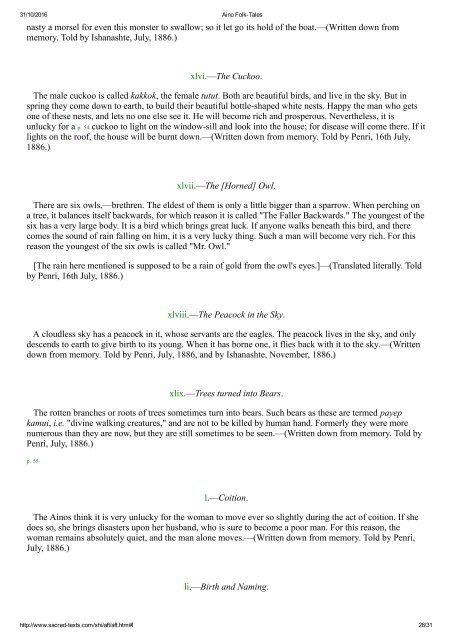Aino Folk-Tales
Create successful ePaper yourself
Turn your PDF publications into a flip-book with our unique Google optimized e-Paper software.
31/10/2016 <strong>Aino</strong> <strong>Folk</strong><strong>Tales</strong><br />
nasty a morsel for even this monster to swallow; so it let go its hold of the boat.—(Written down from<br />
memory. Told by Ishanashte, July, 1886.)<br />
xlvi.—The Cuckoo.<br />
The male cuckoo is called kakkok, the female tutut. Both are beautiful birds, and live in the sky. But in<br />
spring they come down to earth, to build their beautiful bottleshaped white nests. Happy the man who gets<br />
one of these nests, and lets no one else see it. He will become rich and prosperous. Nevertheless, it is<br />
unlucky for a p. 54 cuckoo to light on the windowsill and look into the house; for disease will come there. If it<br />
lights on the roof, the house will be burnt down.—(Written down from memory. Told by Penri, 16th July,<br />
1886.)<br />
xlvii.—The [Horned] Owl.<br />
There are six owls,—brethren. The eldest of them is only a little bigger than a sparrow. When perching on<br />
a tree, it balances itself backwards, for which reason it is called "The Faller Backwards." The youngest of the<br />
six has a very large body. It is a bird which brings great luck. If anyone walks beneath this bird, and there<br />
comes the sound of rain falling on him, it is a very lucky thing. Such a man will become very rich. For this<br />
reason the youngest of the six owls is called "Mr. Owl."<br />
[The rain here mentioned is supposed to be a rain of gold from the owl's eyes.]—(Translated literally. Told<br />
by Penri, 16th July, 1886.)<br />
xlviii.—The Peacock in the Sky.<br />
A cloudless sky has a peacock in it, whose servants are the eagles. The peacock lives in the sky, and only<br />
descends to earth to give birth to its young. When it has borne one, it flies back with it to the sky.—(Written<br />
down from memory. Told by Penri, July, 1886, and by Ishanashte, November, 1886.)<br />
xlix.—Trees turned into Bears.<br />
The rotten branches or roots of trees sometimes turn into bears. Such bears as these are termed payep<br />
kamui, i.e. "divine walking creatures," and are not to be killed by human hand. Formerly they were more<br />
numerous than they are now, but they are still sometimes to be seen.—(Written down from memory. Told by<br />
Penri, July, 1886.)<br />
p. 55<br />
l.—Coition.<br />
The <strong>Aino</strong>s think it is very unlucky for the woman to move ever so slightly during the act of coition. If she<br />
does so, she brings disasters upon her husband, who is sure to become a poor man. For this reason, the<br />
woman remains absolutely quiet, and the man alone moves.—(Written down from memory. Told by Penri,<br />
July, 1886.)<br />
li.—Birth and Naming.<br />
http://www.sacredtexts.com/shi/aft/aft.htm#I 28/31


